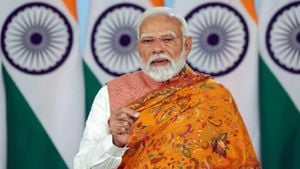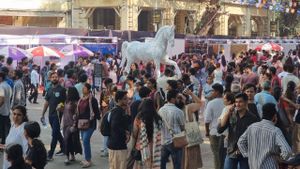The recent German Federal Election results, held on February 24, 2025, have sent shockwaves across the political spectrum, highlighting the Alternative for Germany (AfD) party's remarkable rise. With significant victories across multiple districts, including its best-ever performance in Thüringen, the AfD is not just reshaping local politics but is anticipating influential repercussions on national issues.
Leading the AfD, Björn Höcke proudly declared the results as "historical," with the party capturing 38.6% of the votes cast, far surpassing the major opposition parties. This election marked another milestone for the AfD, emphasizing its increasing relevance among disenchanted voters seeking alternatives to traditional parties. According to reports from Deutsche Presse-Agentur (dpa), Höcke continued to assert the party's intention for transformational politics and rejected coalition partnerships with the CDU, which has suffered significantly.
Meanwhile, the Christian Democratic Union (CDU) finds itself undergoing a painful reassessment. Led by Thüringen’s Minister-President Mario Voigt, the party garnered only 18.6% of the vote, landing it far behind the AfD. Voigt described the election outcome as "a wake-up call for politics," reflecting on the need for the CDU to recalibrate its approach amid shifting voter dynamics.
Even more alarmingly for internal party factions, prominent figures like Christian Hirte expressed deep concern, calling the AfD's success "a warning signal for the whole country." Historically strong in regions like Thüringen, the CDU now finds itself grappling with presenting coherent policies to win back trust from constituents.
Adding to the electoral drama, Thüringian ex-Minister-President Bodo Ramelow also emerged victorious, demonstrating his party based on clear and straightforward policies, stating, "Clearly, one can win elections with honesty." His party, the Left, gained 15.2% of the votes, keeping the political balance contentious and unpredictable.
On the contrary, the Social Democratic Party (SPD) faced criticism after generating only 8.8% of the vote. Party leader Georg Maier lamented, "This is no good day for the SPD," attributing the dire results to perceptions among voters who see the party as culpable for the failing Ampel coalition. He indicated the party had struggled to communicate effectively on key issues like pensions and wages, overshadowed by discussions around migration policy.
Remarkably, the evening wasn't without excitement for parties seeking to establish themselves; the grouping led by Sahra Wagenknecht known as the BSW enabled them to cross the threshold with 9.4%. Their Co-leader Steffen Schütz optimistically stated, "Should we clear the five percent hurdle, it would be historic," emphasizing the party's ambition to impact future governance.
The elections took place under new regulations, which were refined with the aim of reducing Bundestag size. Positioned to create clearer connections between voter preferences and representation, the law stipulates candidates need sufficient second votes for parliamentary entry, which dramatically affects majorities and pluralities.
Voter engagement was notable with over 80.7% participation, substantiations highlight the persistent thirst for democratic engagement across the populace. This compelling turnout poses questions surrounding the effectiveness of current political offerings and the citizens’ reaction against existing governance strategies.
Overall, as the dust settles on these elections, predictions for Germany are anything but straightforward. The AfD is likely to occupy a more significant role both regionally and nationally, sharpening potential conflicts and collaborations across party lines. With looming talks of government formation necessary, the CDU will need to navigate challenges posed by the AfD's ascent, the SPD's retreat, and the Left's surprising resurgence. Observers speculate about the potential fragmentation of the traditional political structure and whether this marks the beginning of the end for established parties.
These results provide a potent reminder of the shifting currents within German politics. They may well act as a touchstone for political organizations to reconsider strategies, project clearer narratives, and connect more meaningfully with voters demanding change.



